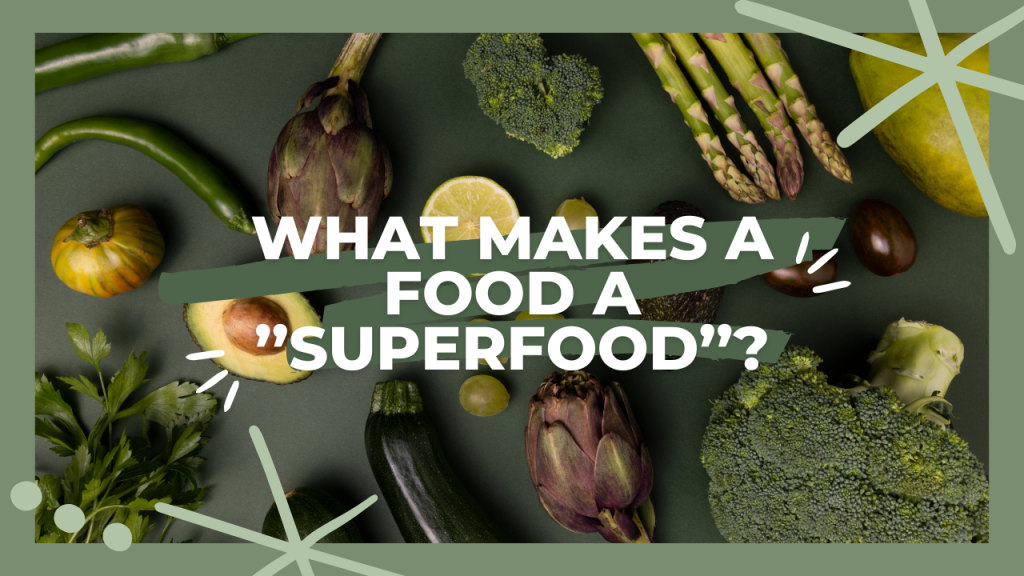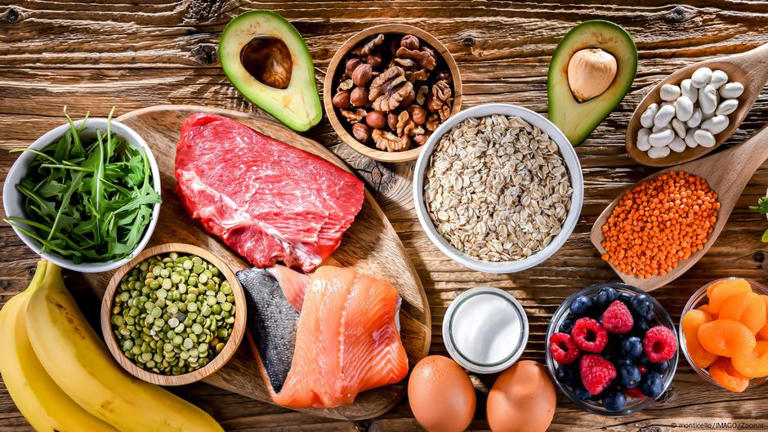
In recent years, the term “superfood” has been tossed around with growing frequency, but what does it really mean? Superfoods are often touted as powerful, nutrient-dense foods that offer a wide array of health benefits. However, in an ever-evolving world of nutrition trends and marketing, it can be difficult to separate genuinely beneficial superfoods from those that are simply overhyped or not backed by solid scientific evidence.
As we move through 2024, the superfood landscape continues to shift, with new contenders emerging and old favorites either falling out of favor or being scrutinized more closely for their claims. In this article, we will explore some of the top superfoods that have earned their reputation through science and those that may not live up to their lofty promises.
What Makes a Food a “Superfood”?
Before diving into the specifics of what’s worth the hype and what’s just a passing trend, it’s important to clarify what defines a superfood. Technically, the term “superfood” isn’t scientifically regulated, and it’s not a recognized category in nutritional science. Instead, the term is often used in marketing to describe foods that are exceptionally rich in nutrients, particularly those with antioxidants, vitamins, minerals, healthy fats, and fiber, which may provide potential health benefits beyond basic nutrition.
Typically, superfoods are:
Nutrient-dense: Packed with vitamins, minerals, and other beneficial compounds.
Rich in antioxidants: Help combat oxidative stress, which can contribute to aging and disease.
Supportive of overall health: May have benefits for heart health, immune function, brain function, or digestive health.
Now, let’s examine which superfoods have substantial scientific backing for their health benefits and which ones may be getting more attention than they deserve.
- The Classics: Tried-and-True Superfoods That Are Worth the Hype
These are the superfoods that have stood the test of time, backed by robust scientific evidence showing their impact on health and wellness.
1.1. Blueberries
Blueberries are often considered one of the top superfoods, and for good reason. Rich in antioxidants, particularly anthocyanins, blueberries have been shown to have anti-inflammatory effects and can help reduce oxidative stress in the body. Research suggests that they can also improve cognitive function, potentially slowing age-related cognitive decline. Regular consumption of blueberries has been linked to improved heart health, thanks to their ability to lower blood pressure and cholesterol levels.
Scientific Backing: A study published in the Journal of Nutritional Biochemistry found that regular consumption of blueberries improved cognitive performance in older adults. The antioxidants in blueberries help protect brain cells from damage and promote healthy brain aging.
1.2. Kale
As a leafy green vegetable, kale is loaded with vitamins A, C, and K, calcium, potassium, and fiber. It also contains antioxidants like lutein and zeaxanthin, which are good for eye health. Kale’s high fiber content can help with digestion, support gut health, and may even contribute to better heart health by improving cholesterol levels.
Scientific Backing: Studies have shown that kale and other cruciferous vegetables may reduce the risk of cancer due to their high levels of sulfur-containing compounds like glucosinolates, which have anticancer properties.
1.3. Salmon (and Other Fatty Fish)
Fatty fish like salmon, mackerel, and sardines are rich in omega-3 fatty acids, which are crucial for heart and brain health. Omega-3s have been shown to reduce inflammation, lower triglycerides, and improve blood vessel function, all of which contribute to a healthier cardiovascular system. Fatty fish are also an excellent source of protein and vitamin D, both important for overall health.
Scientific Backing: A meta-analysis published in the American Journal of Clinical Nutrition found that omega-3s significantly reduced the risk of heart disease. Omega-3s are also associated with better cognitive function and may reduce the risk of mental health disorders like depression.
1.4. Avocado
Avocados are a rich source of healthy fats, particularly monounsaturated fats, which are known to promote heart health by improving cholesterol levels. They’re also packed with fiber, potassium, and vitamin K. Studies have shown that eating avocado regularly can support weight management and lower blood pressure.
Scientific Backing: Research from the Harvard T.H. Chan School of Public Health suggests that consuming avocados may help lower “bad” LDL cholesterol and triglycerides, reducing the risk of heart disease.
- Rising Stars: New Superfoods That Show Promise
These foods have emerged more recently and show considerable potential due to their nutrient content, but their health benefits may still need more long-term research to fully validate their claims.
2.1. Seaweed
Seaweed, especially varieties like nori, kelp, and spirulina, is making waves as a superfood due to its rich content of iodine, vitamins A, C, and K, calcium, iron, and antioxidants. Seaweed is also known for being a good source of omega-3 fatty acids and fiber, which can support heart health, digestive function, and immune health.
Scientific Backing: Studies have indicated that seaweed may help reduce blood pressure, support thyroid function (due to its iodine content), and improve gut health. However, more research is needed to explore the long-term effects of consuming seaweed on overall health.
2.2. Moringa
Moringa, also known as the “drumstick tree,” is native to parts of Asia and Africa. It’s often touted for its nutrient density, containing vitamins A, C, and E, calcium, potassium, iron, and protein. Moringa has anti-inflammatory properties and has been studied for its potential to improve blood sugar levels, support heart health, and combat oxidative stress.
Scientific Backing: Preliminary research suggests that moringa may have significant potential for controlling blood sugar levels, with one study showing that it could reduce blood glucose levels in individuals with type 2 diabetes. However, more clinical trials are needed to confirm these findings.
2.3. Chia Seeds
Chia seeds are often lauded for their omega-3 fatty acids, fiber, protein, and antioxidants. They are also rich in minerals like calcium and magnesium. Chia seeds can absorb a large amount of water, making them an excellent addition to hydration and gut health.
Scientific Backing: A study in the Journal of Nutrition showed that chia seeds could help lower blood pressure and cholesterol levels, contributing to heart health. Due to their high fiber content, they may also support digestive health by improving regularity.
- The Overhyped and Overrated: Foods That May Not Be All They’re Cracked Up to Be
Despite the fervor surrounding some “superfoods,” not all of them live up to the claims. Here are a few that might not be as beneficial as advertised.
3.1. Acai Berries
Acai berries have been widely promoted for their high antioxidant content, but the scientific evidence supporting their purported benefits is somewhat limited. While acai does contain antioxidants like anthocyanins, there are other fruits and vegetables that offer a greater nutrient density at a lower cost, and acai bowls are often loaded with sugar and high-calorie toppings, which can undermine their health benefits.
Takeaway: Acai berries may be a good source of antioxidants, but there are plenty of other fruits, like blueberries or strawberries, that offer similar, if not better, health benefits with fewer added calories.
3.2. Activated Charcoal
Activated charcoal has been marketed as a detoxifying superfood, with claims that it can help cleanse the body of toxins. However, the science behind these claims is lacking. While activated charcoal is sometimes used in medical settings to treat poisonings, there is no solid evidence to support its use for routine detoxification or health benefits.
Takeaway: The body has its own detoxification systems (primarily the liver and kidneys), and there is little evidence that activated charcoal provides any health benefits when consumed in food or drinks.
3.3. Turmeric (in High Doses)
While curcumin, the active compound in turmeric, has been shown to have anti-inflammatory properties and potential benefits for conditions like arthritis, the bioavailability of curcumin in turmeric is relatively low. In order to experience the purported health benefits of turmeric, individuals would need to consume large amounts or take curcumin supplements, which may not be necessary for everyone.
Takeaway: Turmeric has health benefits when used in moderation, but high-dose supplements or powders may not be necessary for most people and can cause digestive issues or interact with medications.







1 thought on “Superfoods in 2024: What’s Worth the Hype and What’s Just a Trend?”